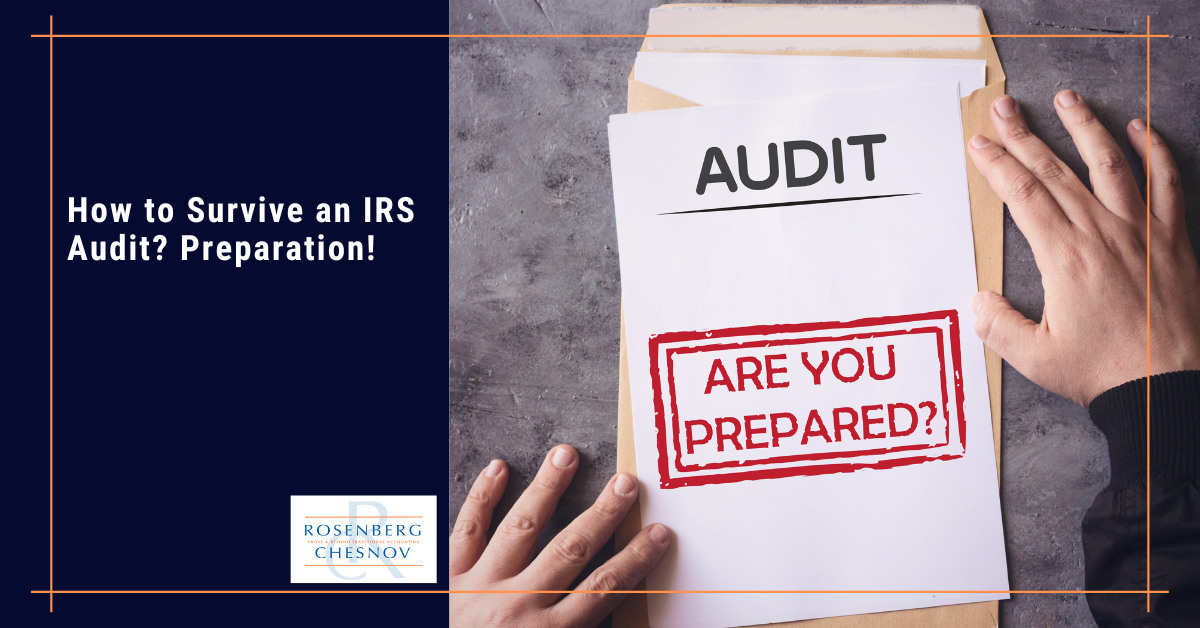

Maximize Your 2024 Refund: Tax Breaks You Might Be Missing
Category: Accounting
Just the simple phrase, “IRS audit,” can be enough to trigger anxiety. For individuals and businesses alike, the thought of a relentless examination of your financial records with the threat of potential penalties looming overhead may send shivers down your spine.
However, if you’re facing this prospect, the first important step is: Don’t panic.
While an IRS audit may seem intimidating (and the process can be stressful and confusing), it shouldn’t be a nightmare. With the proper knowledge, preparation, and approach, you can confidently navigate the audit process and minimize potential negative outcomes.
In this post, we’ll explore valuable insights and practical tips to help you understand why you may be under audit, what to expect from the process, and how to prepare for the audit to maximize your chances for a favorable outcome.
Read on to empower yourself to face the challenge of an IRS audit with confidence.


Being under audit can feel like being under investigation. However, it’s important to remember that an audit does not imply suspicion of criminal activity.
An audit is more of an examination. The purpose can be as simple as confirming accuracy or fixing unintentional errors.
Remember: Being selected for an audit does not necessarily mean you have done anything wrong. The IRS also conducts random audits as part of its compliance efforts.
The audit process begins with a formal notification from the IRS, usually through a letter or notice. This communication will outline the specific items being audited and provide instructions on proceeding. (We’ve covered the types of notices you may receive and what they mean previously on this blog.)
Responding promptly and following instructions is essential to avoid penalties or further complications.
The audit itself can occur in different ways, depending on the complexity and scope of the examination.
During the audit, your examiner will ask questions, review documentation, and potentially request further supporting evidence.
After completing the process, the IRS will present its findings and conclusions. This may result in one of three outcomes:
If adjustments are proposed, you can provide additional explanations or evidence to support your position.
You can do two crucial things immediately upon receiving your audit notice.
Here are some more actions you take to prepare:
The IRS’ primary objective is to ensure the accuracy and completeness of your tax return.
Towards that end, your examiner will closely examine various aspects of your financial records to verify that you have reported your income correctly and have claimed legitimate deductions, credits, and exemptions.
Here are some key areas that an IRS audit typically focuses on:
Of course, the specific focus areas of an IRS audit can vary depending on the nature of your tax return and the information that raises concerns or triggers the audit.
First, and most importantly, do not lie to the auditor under any circumstances—that is a federal crime.
In general, be upfront, prompt, courteous, and professional. Do not joke around with an IRS employee. During the examination, answer only the questions they ask and do not say anything they might interpret as a threat.
Avoid making speculative statements or guesses about any unclear or uncertain information. Stick to the facts and provide accurate details based on your available documentation and records.
Only bring up personal or unrelated information that is relevant to the audit. Stay focused on providing the necessary information and addressing the specific questions asked.
Finally, refrain from giving incomplete or partial answers that may raise further suspicion or require additional follow-up questions.
Ultimately, the keys to successfully preparing for an IRS audit are knowledge, organization, a cooperative mindset…and, once again, expert guidance from tax professionals (like us).
If you are a client and would like to book a consultation, call us at +1 (212) 382-3939 or contact us here to set up a time.
If you aren’t a client, why not? We can take care of your accounting, bookkeeping, tax, and CFO needs so that you don’t have to worry about any of them. Interested? Contact us here to set up a no-obligation consultation.
Interested in receiving updates in your mailbox? Check out our newsletter, full of information you can use. It comes out once every two weeks, and you can register for it below.


Category: Accounting


Category: Accounting


Category: Accounting